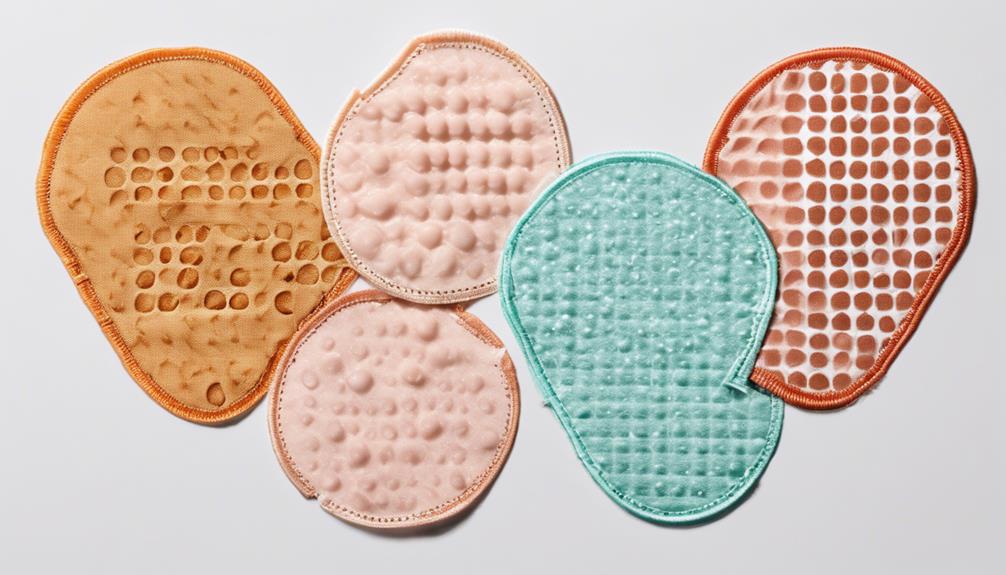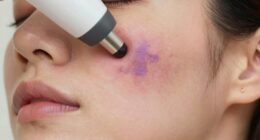Probiotic patches are transforming acne treatment by delivering beneficial bacteria directly to your skin. They target inflammation and help restore the balance of your skin microbiome, which is essential for preventing breakouts. These innovative patches utilize advanced technology to provide controlled release of probiotics, like Staphylococcus epidermidis, which inhibits acne-causing bacteria. With ongoing research, the future looks promising for this biotech solution. Explore how you can optimize your skin health even further with these exciting developments.
Key Takeaways
- Probiotic patches deliver beneficial bacteria directly to acne lesions, allowing for targeted and controlled treatment of inflammation and skin health.
- Advanced delivery systems encapsulate probiotics, preserving their fermentation activities and enhancing effectiveness against acne-causing bacteria like Cutibacterium acnes.
- Strain-specific formulations of probiotics, such as Staphylococcus epidermidis, inhibit the growth of acne-related bacteria and reduce inflammation.
- Topical probiotics can restore balance to the skin microbiome, addressing dysbiosis and improving overall skin conditions like acne.
- Incorporating probiotics through patches represents a promising frontier in biotech for treating acne more effectively and conveniently.
Understanding Acne and Its Causes
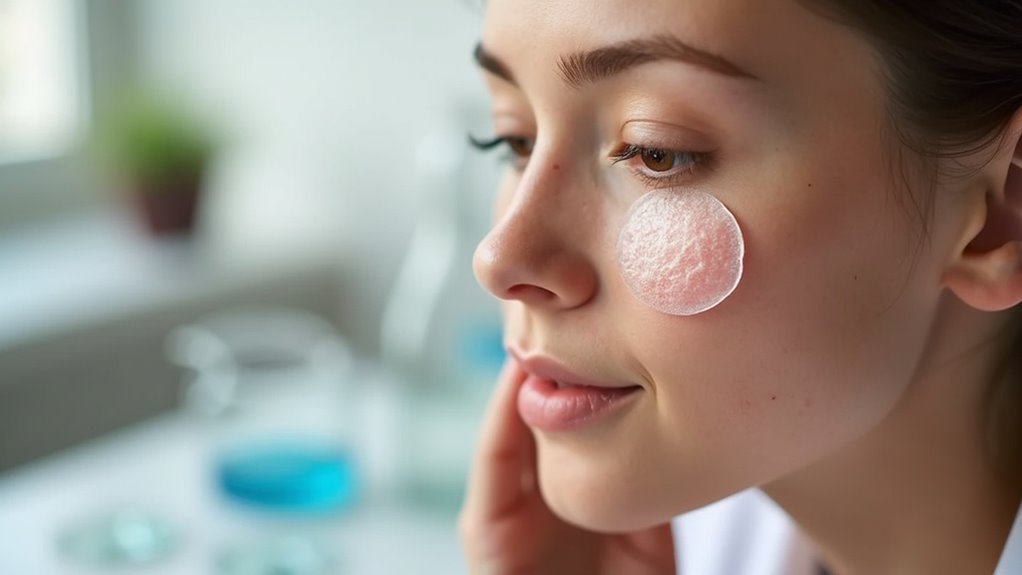
Acne isn’t just about having a few pesky pimples; it’s a complex skin condition caused primarily by inflammation in the sebaceous glands. This inflammation leads to clogged pores from excess sebum and dead skin cells, resulting in blackheads, papules, and pustules.
Various triggers, including hormonal fluctuations, dietary choices, and environmental factors, play a significant role in acne development. The skin microbiome is vital here; an overgrowth of Cutibacterium acnes bacteria can trigger inflammatory lesions.
When the balance of your skin’s bacteria is disrupted, a condition known as dysbiosis occurs, exacerbating acne. Addressing these bacteria through probiotics may help restore balance and tackle health issues related to acne.
Understanding these causes is essential for effective treatment.
The Role of Gut Health in Skin Conditions

Have you ever considered how your gut health affects your skin?
The gut-skin connection reveals that imbalances in gut bacteria can lead to inflammation and skin issues like acne.
Gut-Skin Connection
When considering skin health, it is vital to recognize the gut-skin axis, which links the state of your gut microbiota to various skin conditions. Imbalances in gut health can lead to inflammatory skin conditions like acne and eczema. With about 70% of immune cells in your gut, it plays a significant role in skin health. Understanding the gut-skin connection can further enhance your approach to treating skin conditions.
| Gut Health Impact | Skin Condition Examples |
|---|---|
| Dysbiosis increases inflammation | Acne |
| Probiotics restore balance | Eczema |
| Beneficial bacteria support health | Rosacea |
Microbiome’s Impact on Inflammation
The link between gut health and skin conditions highlights how the microbiome impacts inflammation. When your gut microbiome is out of balance, it can lead to dysbiosis, weakening your immune response and increasing inflammation. This process plays a significant role in developing acne and other inflammatory skin conditions.
With about 70% of your immune cells located in the gut, maintaining gut health is essential for regulating these inflammatory responses. Additionally, “leaky gut” syndrome allows harmful substances into your bloodstream, worsening acne through systemic inflammation.
Incorporating probiotics into your diet can help restore this balance, reduce inflammation, and ultimately improve skin health by promoting beneficial bacteria and enhancing gut barrier integrity. Taking care of your gut can make a noticeable difference in your skin.
Probiotics for Skin Health
Given the intricate relationship between gut health and skin conditions, understanding how probiotics can enhance skin health is vital.
Probiotic bacteria, like Lactobacillus and Bifidobacterium, play a significant role in maintaining your skin microbiome. When your gut is balanced, it can reduce inflammation and improve conditions like inflammatory acne.
A well-functioning gut helps prevent “leaky gut,” which can exacerbate skin issues and worsen acne lesions. Incorporating a probiotic supplement can support beneficial bacteria, leading to fewer inflammatory markers and clearer skin.
Additionally, topical application of probiotics may offer localized benefits, enhancing skin health directly. By prioritizing gut health through probiotics, you’re taking an important step toward achieving healthier, clearer skin.
The Skin Microbiome and Probiotics
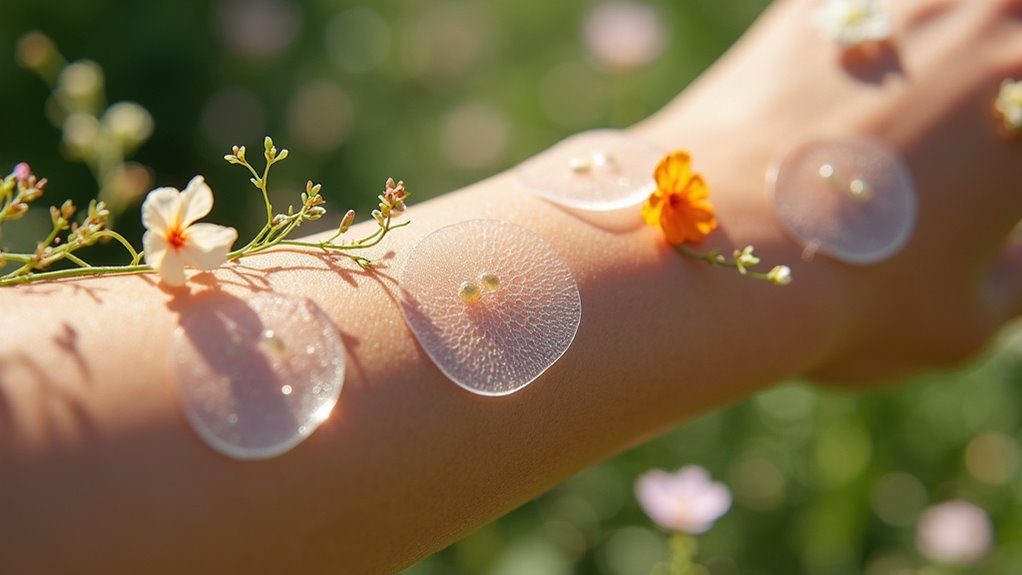
Understanding the skin microbiome is essential for grasping how probiotics can influence acne management. Your skin hosts a variety of microorganisms, including beneficial bacteria like Staphylococcus epidermidis and harmful ones such as Cutibacterium acnes.
When the balance of this microbiome gets disrupted, it can lead to inflammatory acne vulgaris, affecting about 80% of Americans. Probiotics, especially S. epidermidis, can help manage acne by producing short-chain fatty acids that inhibit C. acnes growth and reduce inflammation.
Topical probiotics delivered through advanced biomaterials, like polysulfone microtube array membranes, offer a targeted approach to treating acne lesions. Research shows that applying S. epidermidis can notably lower C. acnes counts and pro-inflammatory cytokines, paving the way for innovative acne treatments.
How Probiotic Patches Work
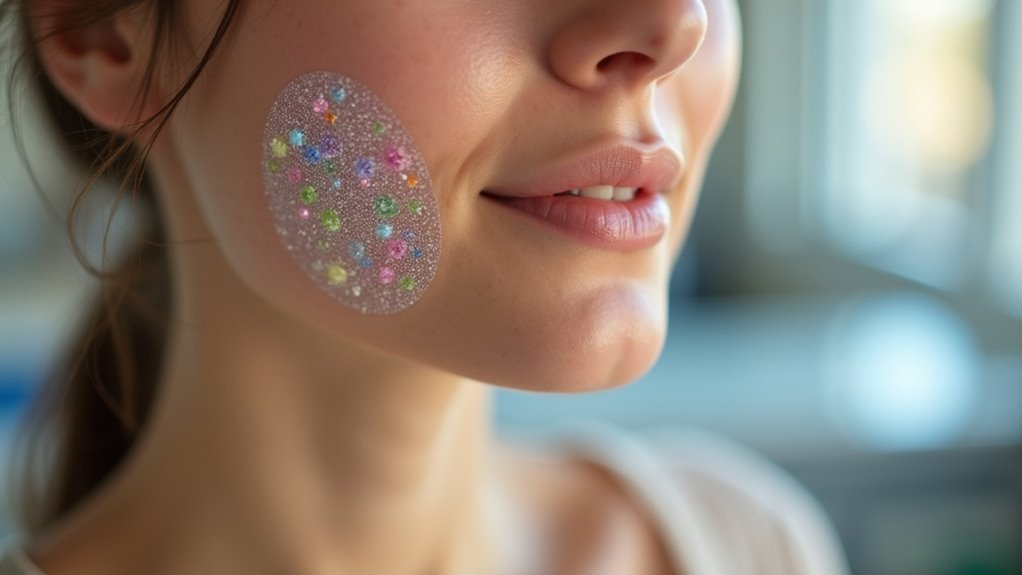
Probiotic patches work by delivering encapsulated strains of beneficial bacteria directly onto your skin, targeting acne-causing organisms like Cutibacterium acnes. These patches create a localized environment that enhances glycerol fermentation, leading to the production of short-chain fatty acids (SCFAs) that help reduce inflammation. The polysulfone microtube array membranes guarantee effective probiotics by preventing leakage while allowing controlled release of beneficial metabolites.
| Component | Function | Benefit |
|---|---|---|
| Encapsulated Probiotics | Target harmful bacteria | Rebalances skin microbiome |
| SCFAs | Anti-inflammatory properties | Reduces acne inflammation |
| PSF MTAM | Controlled release of probiotics | Maintains efficacy |
| Non-invasive | Alternative to traditional methods | Minimizes side effects |
This innovative approach provides a promising, non-invasive alternative for acne treatment.
Benefits of Probiotic Treatment for Acne
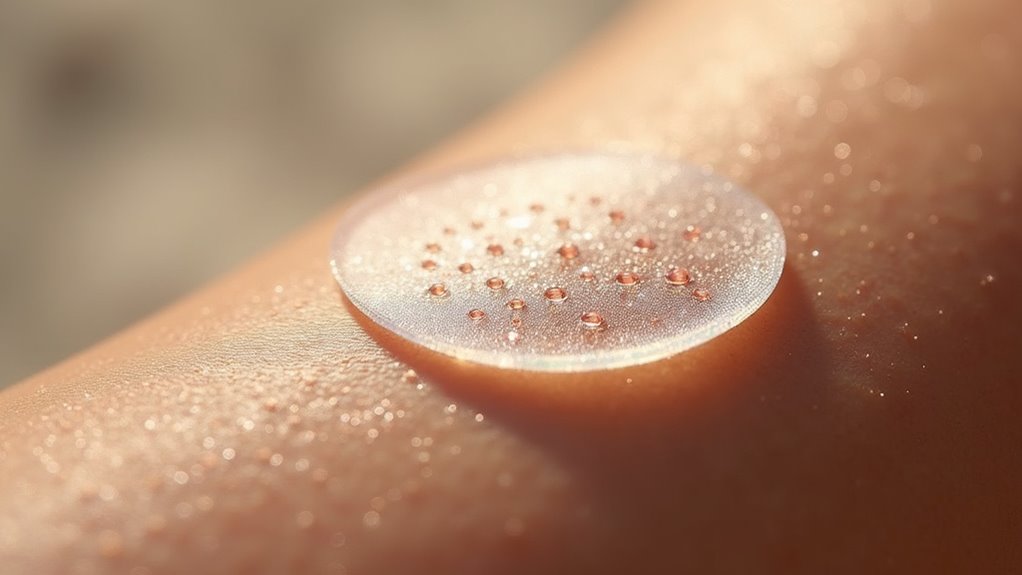
While you might’ve tried various treatments for acne with limited success, probiotic therapy offers a promising solution by directly addressing the root causes of skin issues.
Probiotics, such as S. epidermidis, can inhibit the growth of acne-causing bacteria like C. acnes through the production of short-chain fatty acids, which reduce inflammation and lower skin pH.
Clinical studies show that topical probiotics can considerably decrease the severity and frequency of breakouts, with some users experiencing up to a 70% reduction in symptoms.
By promoting the growth of beneficial bacteria, probiotics restore balance to the skin microbiome, combatting dysbiosis linked to acne.
This holistic approach not only targets acne but also alleviates associated irritation and inflammation, enhancing overall skin health.
Future Directions in Probiotic Research
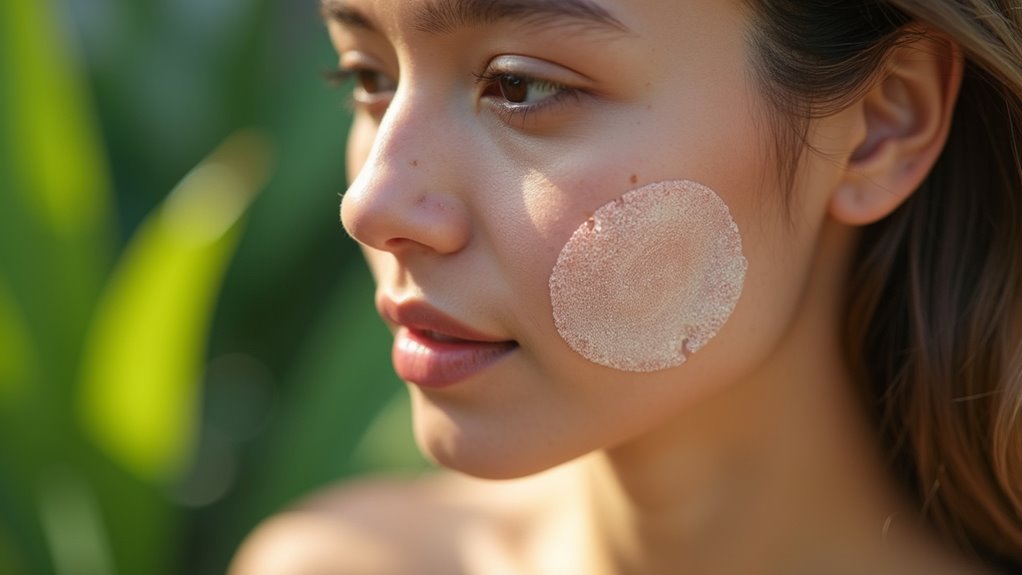
As you explore the future of probiotic research, you’ll find exciting advancements in innovative delivery systems and strain-specific formulations.
These developments aim to enhance the effectiveness of treatments by targeting specific skin issues with precision.
Innovative Delivery Systems
Innovative delivery systems are transforming how we approach acne treatment by harnessing the benefits of probiotics. Probiotic patches, utilizing polysulfone microtube array membranes (PSF MTAM), create a localized delivery system for beneficial bacteria like S. epidermidis.
This method enhances treatment efficacy for acne lesions without direct skin contact. Encapsulating probiotics within PSF MTAM guarantees they retain their fermentation activities, promoting the sustained release of therapeutic agents right at the source of inflammation.
S. epidermidis ferments glycerol to produce short-chain fatty acids (SCFAs), which reduce inflammation and inhibit the growth of acne-causing bacteria like C. acnes. Additionally, probiotics for weight loss have been shown to improve overall skin health by supporting the body’s natural defenses.
Research continues to optimize these probiotic skin care solutions, aiming to address both acne and other inflammatory skin conditions through innovative delivery methods.
Strain-Specific Formulations
Strain-specific formulations are at the forefront of probiotic research, aiming to enhance acne treatment by focusing on the unique properties of individual bacterial strains.
By targeting specific strains like Staphylococcus epidermidis, these formulations inhibit the growth of acne-causing bacteria such as Cutibacterium acnes.
Probiotics like Lactobacillus acidophilus and Bifidobacterium lactis show promising anti-inflammatory properties, potentially reducing the severity of acne lesions.
Probiotic patches deliver these beneficial bacteria directly to acne lesions, ensuring a controlled release while maintaining safety.
Additionally, the metabolic products of probiotics, like short-chain fatty acids, can considerably diminish inflammation associated with acne.
This targeted approach could revolutionize how we treat inflammatory skin conditions, offering tailored solutions for different skin types and concerns.
Tips for Maintaining Skin and Gut Health

To keep your skin and gut healthy, focus on a balanced diet that includes plenty of fruits, vegetables, and whole grains. This clean diet enhances your gut microbiome, which can lead to healthier skin and reduced acne.
Staying hydrated is essential too; drink adequate water daily to support skin elasticity and flush out toxins that may cause inflammation.
Regular exercise promotes circulation and reduces stress, both of which help prevent hormonal changes that trigger acne flare-ups.
Incorporate probiotics by enjoying yogurt, kefir, or fermented vegetables to rebalance your gut microbiota.
Finally, avoid overusing skincare products; opt for gentle, non-comedogenic formulations to maintain your skin barrier integrity and minimize irritation.
Additionally, consider adding chia seeds to your diet, as their high fiber content can aid in satiety, potentially supporting your skin health journey.
Your skin will thank you!
Frequently Asked Questions
Can Probiotics Clear up Acne?
Yes, probiotics can help clear up acne.
By promoting beneficial bacteria on your skin and reducing inflammation, they tackle factors that contribute to acne. When you apply probiotics topically, they can inhibit harmful bacteria like Cutibacterium acnes.
Consistent use may lead to noticeable improvements in your skin’s appearance, as many users report fewer lesions and less inflammation over time.
How Long Does It Take for Probiotics to Work for Acne?
When using probiotics for acne, you might notice results in as little as three weeks, but it can take longer for some.
Expect an adjustment period where your acne may worsen initially.
Many users report significant improvements after consistent use over several months, with some seeing a 70% reduction in breakouts after eight months.
Since everyone’s skin reacts differently, patience and a holistic skincare approach are key to finding what works for you.
What Kills Acne Bacteria Fast?
When it comes to tackling acne, you’ve got to hit the nail on the head.
Fast-acting treatments often include benzoyl peroxide, which kills acne bacteria by introducing oxygen to the environment, making it hostile for C. acnes.
Salicylic acid also works wonders by exfoliating dead skin cells and unclogging pores.
For quicker results, consider topical antibiotics, like clindamycin, which can swiftly reduce bacterial growth and inflammation on your skin.
What Is the Best Probiotic for Skin Problems?
When it comes to the best probiotic for skin problems, you’ll want to contemplate strains like Lactobacillus acidophilus and Bifidobacterium lactis.
These probiotics can improve gut health, reduce inflammation, and help balance your microbiome, which is essential for clear skin.
They not only support your gut but also promote skin health through the gut-skin connection.
Incorporating these probiotics into your routine could greatly benefit your skin and overall well-being.
Conclusion
In the quest for clear skin, think of your body as a garden. Just as a thriving garden needs healthy soil, your skin flourishes when your gut’s in balance. Probiotic patches are like a skilled gardener, nurturing both your skin and gut. While research is still evolving, these patches could be the breakthrough you’ve been waiting for. So, as you explore this innovative treatment, remember: a healthy gut might just be the secret ingredient to your radiant complexion.




